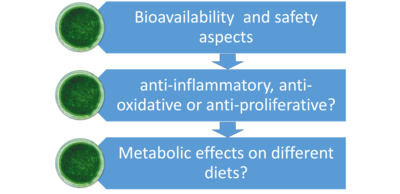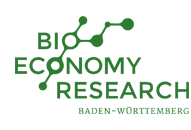Bioavailability, health benefits and safety of nutrients from microalgae

Microalgae contain macro- and micronutrients that are of interest for human nourishment: e.g. omega-3 fatty acids, vitamins, carotenoids and galactolipids. The aim of the nutritional subproject was to develop a scientific basis for the use of microalgae and their extracts for human nutrition concepts. Various animal and cell culture experiments were carried out for this purpose.
The bioavailability of the nutrients after a mechanical disruption as well as safety aspects were investigated in a mouse model. It was shown in animal experiments that proteins, fatty acids, and carotenoids from disrupted microalgae are bioavailable and that microalgal supplementation had no negative health effects in vivo. After feeding for 14-days a microalgae-enriched died, neither weight loss nor signs of cardiac, hepatic and renal toxicity or morphological changes of organs and of the gastrointestinal tract could be observed.
In addition to the microalgae genus Chlorella, the genera Nannochloropsis and Phaeodactylum were examined for their physiological and preventive effects on cell cultures. Here, a variety of the aqueous and ethanolic microalgae extracts showed anti-proliferative, anti-inflammatory and anti-oxidative effects in vitro. Anti-inflammatory effects were investigated on human cells of the peripheral blood, anti-oxidative effects on human neutrophil granulocytes. To detect anti-proliferative effects, human colon and cervix carcinoma cell lines were used. The results show a health benefit of microalgae in cell cultures, which still has to be proven in animal and human studies.
The research project was jointly carried out by the Institute of Nutritional Medicine of the University of Hohenheim and the Institute of Physiology and Biochemistry of Nutrition at the Max Rubner-Institut. Microalgae and their extracts were provided by the partners in the research network.
| Project title | Bioavailability, health benefits and safety of nutrients from microalgae and their processed products - Implications for new algae-based human nutrition concepts | |
| Institutions | University of Hohenheim, Institute of Nutritional Medicine Max Rubner-Institute (MRI), Institute of Physiology and Biochemistry of Nutrition | |
| Research group | Prof. Dr. med. Stephan Bischoff, Dr. Sandrine Louis, Ulrike Neumann (Uni Hohenheim), PD Dr. Karlis Briviba, Andrea Gille (MRI) | |
| Project status | completed |
